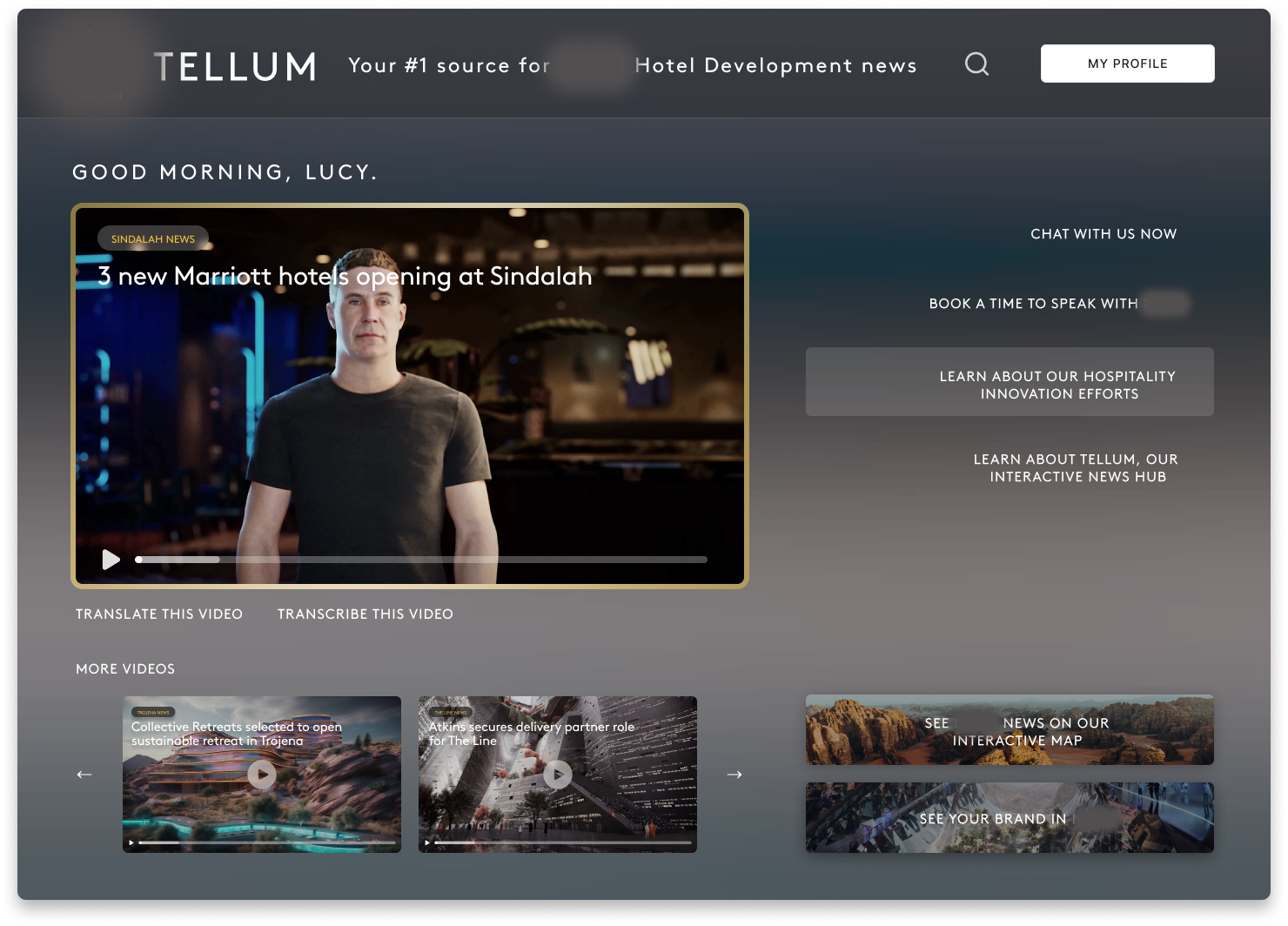Hospitality, Software & Technology
Forging lifelong partnerships in hotel development through XR experiences.
Project Overview
Duration / Feb 2023 - Nov 2023
Client
The largest government-funded urban development project in the Middle East, incorporating cutting-edge technology and futuristic infrastructure.
Challenge
Transform the hotel development process by leveraging Extended Reality (XR) to create unique experiences that attract and convince major luxury hotel brands to come to a developing region.
End Deliverable
Explored megatrends within the Extended Reality space and facilitated product design from concept to MVP, focusing on integrating new, unique experiences into different phases of the hotel development process.
The Team
(1) Global Venture Building Lead
(1) Global UX Lead
(1) Venture Executive
(1) Senior UX Researcher
(1) UX Researcher
(1) UX Designer
(2) SME - Hotel Developer
My Role / User Experience (UX) Designer
Core Responsibility
A B2B, web-based MVP as the first destination in a series of mixed reality experiences, serving as the news hub that provided live project progress, environmental updates, interactive engagement, and fostered relationships.
Contribution
User Research
Product Design
Usability Testing
Design Tools
Figma
Adobe Photoshop
Midjourney AI
Introduction
In February 2023, I joined a diverse team of hotel developers, venture executives, and researchers with the mission to rethink how major hotels could attract other high-end luxury hotels and transform the due diligence process for forming partnerships. We spoke with Metaverse experts to identify megatrends, interviewed global hotel developers to understand their processes, and approached top luxury hotel brand developers to uncover pain points. Our research guided us in building a series of unique experiences that would take executives from initial introductions to the launch of their first establishment in the Middle East.
Learning their Process
Hotel development was an unfamiliar space for us all, especially when considering expansion into another region. Over the next three months, we engaged with Heads of Development from top luxury hotel brands to understand their current processes and challenges in expansion and partnership formation.
We mapped out their entire journey, capturing their frustrations, excitement, due diligence processes, tools, deadlines, interactions, and aspirations.
Key Takeaway
Even after thorough due diligence, developers were still scared to take the “Leap of Faith” to expand to the Middle East because of demand, environmental, and governmental uncertainties.
Building Courage to Leap
At this point, we had a solid understanding of what needed to be added to the development process to foster successful partnerships in the Middle East. We needed an experience that would shift developers' perceptions from what they believe the Middle East is like to the reality of the region. With enough data, we moved on to formulating our hypotheses for solutions and began concept testing.
Testing our Concepts
Having understood that we needed to change the perceptions developers had, our concept ideas were limitless. I created 20 different concept cards and storyboards that individually correlated to each phase of the development process.
We dove deep into the Extended Reality space, exploring augmented reality solutions that could transform your room into a luxurious, furnished version of the new hotel, to using metaverse headsets to experience the physical site as buildings were being constructed in the digital world, and even receiving live updates from a hologram at tradeshows.
After designing the concepts cards, we ran some tests.
Key Learnings
SkyDrop, TimeMaps, and Avatar Updates performed extremely well because they all provided some sort of live feedback or information.
Developers didn’t want to leave their offices to use fancy equipment; they just wanted to use their laptops.
They needed a better view of the surrounding area—they were using Google Maps to make billion-dollar decisions.
Building the Experiences
With SkyDrop, TimeMaps, and Avatar Updates testing well, we realistically could only build TimeMaps and showcase Avatar Updates using Proto at that time. SkyDrop would have required physical drones to be active on the dig site, which wasn't feasible in our current phase.
Avatar Updates
That being said, Avatar Updates leveraged Proto, a portable device that displays a hologram of the speaker inside a box. We purchased the box with the intent of bringing it to trade shows, allowing Developers to interact directly with our Clients via a hologram, while our Clients remained in their offices at home.
Fun Fact: Our Venture Executive delivered the final pitch using the Proto as a proof of concept.
TimeMaps
I helped transform TimeMaps into Tellum, our MVP that served as an interactive news hub hosted by our Client, offering live project progression, environmental updates, chatrooms, maps, and more.
Tellum / Learn
Tellum / Interactive Map
End Results
Tellum was approved and received private funding for development over the next six months, with plans to launch publicly within a year (2026).
During our interviews, we attracted potential hotel brands interested in the region and the experiences we were creating. We passed them along the funnel to our Client.
Learnings
During our interviews, I learned that there's always a deeper meaning behind the pains users feel. While some issues might be surface-level, to be truly successful, you need to take the time to identify the problem at its core.
Building trust between large companies takes more than numbers and a fancy platform—it requires interactions, understanding, and a shared vision. Bias may be present, but it's your job as the seller to correct it.







